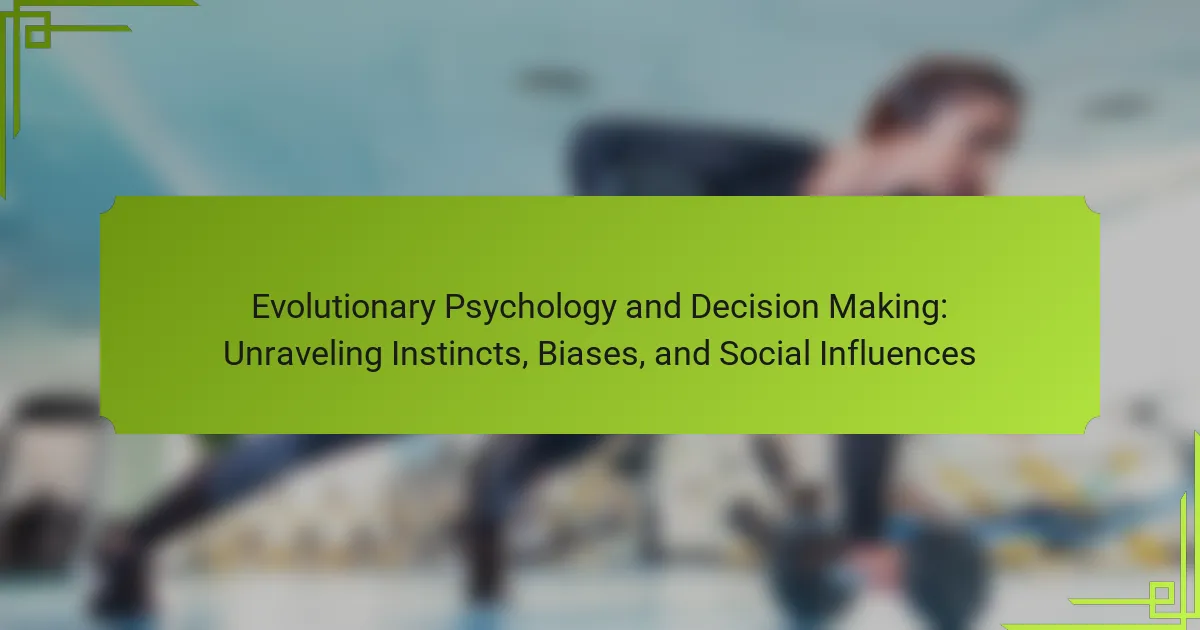Understanding how evolutionary psychology influences decision-making can enhance your choices in personal and professional contexts. This field reveals innate instincts and biases that shaped our survival. It examines the preference for immediate rewards and how social influences impact decisions. By exploring these elements, we can develop better decision-making strategies.

How does evolutionary psychology influence decision-making?
Evolutionary psychology significantly shapes decision-making by highlighting innate instincts and biases. These psychological mechanisms evolved to enhance survival and reproduction, influencing choices in social contexts. For example, humans often display a preference for immediate rewards due to ancestral environments where quick gains were crucial. This tendency can lead to impulsive decisions, reflecting a root attribute of evolutionary psychology. Additionally, social influences, such as group dynamics, further modify decision-making processes, showcasing the complex interplay between evolutionary traits and contemporary contexts. Understanding these influences can improve decision-making strategies in various fields.
What are the fundamental principles of evolutionary psychology?
The fundamental principles of evolutionary psychology focus on how human behavior and decision-making are influenced by evolutionary processes. These principles include the concept of natural selection, which shapes instincts and biases, and the understanding that social influences are rooted in ancestral environments. Evolutionary psychology posits that many psychological traits are adaptive responses to survival and reproduction challenges. It emphasizes the role of evolved mechanisms in shaping preferences, mating strategies, and social interactions, providing insights into human behavior through an evolutionary lens.
How do instincts shape our decision-making processes?
Instincts significantly influence our decision-making processes by triggering automatic responses to stimuli. These responses are rooted in evolutionary psychology, where instincts evolved to enhance survival. For example, the fight-or-flight response shapes choices during perceived threats, often leading to quick, biased judgments. Social influences further complicate decision-making, as instincts can be reinforced or contradicted by group dynamics. Understanding these factors can help individuals recognize biases and improve decision quality.
What role do survival instincts play in modern choices?
Survival instincts significantly influence modern decision-making by shaping our responses to threats and opportunities. These instincts, rooted in evolutionary psychology, guide behaviors such as risk assessment and social interactions. For instance, the instinct for self-preservation can lead to cautious choices in uncertain environments. Additionally, social instincts drive collaboration, enhancing group survival. Understanding these instincts helps clarify biases in judgment and highlights the impact of primal emotions on contemporary choices.
What cognitive biases arise from evolutionary adaptations?
Cognitive biases from evolutionary adaptations include confirmation bias, loss aversion, and in-group favoritism. These biases enhance survival by promoting quick decision-making and social cohesion. Confirmation bias leads individuals to favor information that supports existing beliefs, while loss aversion makes losses feel more significant than equivalent gains. In-group favoritism encourages loyalty to one’s group, enhancing cooperative behavior essential for survival. Understanding these biases reveals their role in shaping human behavior and decision-making processes.
How do confirmation bias and availability heuristic affect judgments?
Confirmation bias and availability heuristic significantly distort judgments by favoring information that aligns with pre-existing beliefs and recent experiences. Confirmation bias leads individuals to seek out and prioritize evidence that supports their views, while the availability heuristic causes reliance on immediate examples that come to mind. These cognitive biases can hinder objective decision-making, leading to flawed conclusions and perpetuating misconceptions. Understanding these biases is crucial in evolutionary psychology, as they reveal how instinctual responses shape social influences and decision-making processes.
What social influences impact decision-making in groups?
Social influences significantly impact decision-making in groups by shaping perceptions and behaviors. Conformity, social norms, and groupthink are key factors. Conformity leads individuals to align their decisions with group opinions, often prioritizing cohesion over personal beliefs. Social norms establish expected behaviors, guiding choices based on perceived approval. Groupthink can stifle critical thinking, resulting in consensus without thorough evaluation. These influences highlight the interplay between individual instincts and collective dynamics in decision-making processes.
How does groupthink emerge from evolutionary perspectives?
Groupthink emerges from evolutionary perspectives as a social survival mechanism. Humans evolved to prioritize group cohesion for protection and resource sharing. This instinct leads to conformity, reducing dissent and encouraging consensus, even at the cost of critical thinking. As a result, groupthink can hinder effective decision-making, especially in diverse groups. The evolutionary bias towards social acceptance reinforces this phenomenon, making it a prevalent issue in collaborative environments.
What unique attributes distinguish evolutionary psychology from other psychological theories?
Evolutionary psychology is distinguished by its focus on innate behaviors shaped by natural selection. Unlike other theories, it emphasizes the role of evolutionary adaptations in decision-making processes. Key unique attributes include the emphasis on ancestral environments, the integration of biological and psychological perspectives, and the exploration of universal human behaviors. These attributes highlight how instincts and biases influence social interactions and choices, setting evolutionary psychology apart from other psychological frameworks.
How does culture interact with evolutionary psychology in decision-making?
Culture significantly influences decision-making by shaping instincts and biases within the framework of evolutionary psychology. Cultural norms and values provide context for how individuals assess risks and rewards, often altering innate tendencies. For instance, collectivist cultures may prioritize group harmony over individual gain, impacting choices in social and economic contexts. This interaction underscores the complexity of human behavior, illustrating that decisions are not solely driven by evolutionary instincts but are also molded by cultural experiences. Understanding this interplay can help in predicting behavior across diverse populations.
What are the rare traits of decision-making influenced by evolutionary psychology?
Rare traits of decision-making influenced by evolutionary psychology include instinctual biases, social conformity, and risk aversion. These traits often arise from ancestral survival mechanisms. Instinctual biases lead to quick judgments based on limited information, while social conformity reflects the tendency to align decisions with group norms. Risk aversion, a unique attribute, emphasizes the preference for safer choices to avoid potential losses. Understanding these rare traits enhances the comprehension of human behavior in decision-making contexts.
How can understanding these concepts improve personal decision-making?
Understanding evolutionary psychology enhances decision-making by revealing how instincts, biases, and social influences shape choices. Recognizing these factors allows individuals to identify cognitive biases, such as confirmation bias, which can cloud judgment. Additionally, understanding social influences helps navigate group dynamics, leading to more informed decisions. By applying these insights, one can improve self-awareness and enhance critical thinking skills, ultimately leading to better outcomes in personal and professional contexts.
What best practices can enhance decision-making strategies?
To enhance decision-making strategies, apply insights from evolutionary psychology. Understand instincts, recognize biases, and leverage social influences. These practices improve critical thinking and reduce cognitive errors. For example, fostering awareness of heuristics can mitigate decision-making pitfalls. Engaging in diverse perspectives promotes balanced viewpoints, leading to better outcomes.
What common mistakes should be avoided in decision-making?
Common mistakes in decision-making include overconfidence, confirmation bias, emotional reasoning, and neglecting long-term consequences. Overconfidence leads individuals to underestimate risks, while confirmation bias causes them to favor information that supports their existing beliefs. Emotional reasoning can cloud judgment, leading to impulsive choices. Lastly, neglecting long-term consequences often results in decisions that may seem beneficial in the short term but are detrimental over time. Understanding these biases and instincts rooted in evolutionary psychology can enhance decision-making effectiveness.
What insights can experts provide on evolutionary psychology and decision-making?
Experts assert that evolutionary psychology significantly influences decision-making by shaping our instincts, biases, and social behaviors. This field examines how inherited psychological traits affect choices, often prioritizing survival and reproduction. For instance, cognitive biases like loss aversion stem from ancestral environments where avoiding risks was crucial. Additionally, social influences, such as group dynamics, can alter individual decisions, reflecting our evolutionary need for social cohesion. Understanding these elements helps in recognizing the underlying motivations behind human behavior in various contexts.
